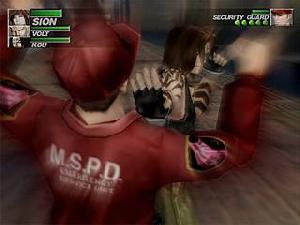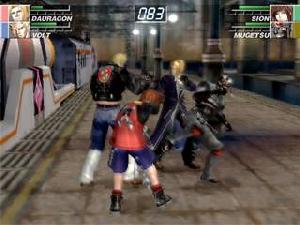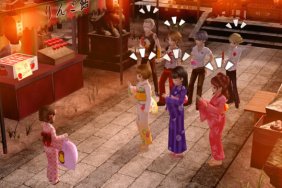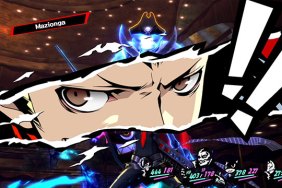If your name’s not on the list, you’re not coming in.
They are the enforcers of the night. Wielding the mighty clipboard, they have
the power to decide your fate, if only for an evening. They are the guardians
of the realm, the keepers of the gate armed only with an earpiece and a bad attitude.
They are the judge, jury, and executioner in a world filled with danger, excitement,
and plenty of vomit. Adored by some and hated by others, these hardened individuals
have given their life to the night. And for this, bouncers, I salute you.
During my nighttime travels, I have come across more than my fair share of
bouncers. Some were cool, while others were most definitely not. It’s just so
hard to tell these days.
Even before Sony’s new system was released, The Bouncer was on the
lips of many gamers. Screenshots aplenty showcased brilliant graphics and promised
plenty of action. The only thing left to question was the game’s most vital
aspect: gameplay.
So when the game finally made it past the GR security team and bomb sniffing
dogs, it was rushed straight into the secret testing lounge for evaluation.
The next few days were spent solely with Square’s latest uberkind and boy, was
it disappointing.
It’s easy to tell what the developers focused on, because The Bouncer
is obviously one of the best-looking games on a console to date. Near flawless
animations and picture perfect visuals make it a great choice to show off the
sleek Sony super machine to your friends. Once the game begins, though, the
Bouncer sheds it’s pretty boy image and gets down and dirty.
In typical video game fashion, you play a hero trying to save a girl. A local
sweetheart named Dominique has been kidnapped by a bunch of strange looking
ninja guys and naturally you, along with a pair of other bouncers, must run
off to save her. Somehow, this all ties into a mission to save the world, but
I bet you knew that already.
To get started, you’ll choose from one of three bouncers: Sion, Kou, and Volt.
Each has his own story and only by playing through with all of them will you
get the full picture. The Bouncer also throws some RPG aspects into the
mix with experience points going toward stat increases as well as fresh new
moves. Only after playing the game several times will you be able to max out
all the characters and realize their full potential. Three cheers for replay
value!
The control is a bit on the loose side, but after a little while it shouldn’t
be very bothersome…unlike the attack scheme. High, medium, low, and jump attacks
make up your arsenal, but exactly what happens when you press the buttons is
almost random. Players are not able to control punches and kicks separately
and must rely on the iffy pressure-sensitive PS2 controller buttons to determine
different attacks. For example, pressing high attack three times for Kou unleashes
the “triple jab,” but a firm press the first time will change it to a “triple
roundhouse kick.” The pressure-sensitive buttons take a lot of getting used
to and even a few hours of play won’t guarantee mastery over it.
One cool move that’s easy to execute is the Trinity Rush. When one of your
buddies gives the signal, the single press of a button will prompt a cool cut
scene showing our heroes performing some lethal moves. The downside is that
a paper cut would do more damage to these guys than the Trinity Rush. An enemy
that can survive a kick to the throat and two neck breaks is not one
to be trifled with. Talk about disappointing.
 The
The
ability to choose your target is strangely absent. Characters will automatically
aim for the closest enemy, which can sometimes throw combos off. Not a huge
problem, but annoying nonetheless.
One definite problem is the camera. While The Bouncer cam puts on a
good show, it chooses fashion over function every time. Dramatic camera angles
produce awesome screen shots, but as a result you’ll spend half the time wondering
what’s sitting right in front of your face. I guess our cameraman has spent
one too many nights staggering home from work.
Yet another bummer is the stop-and-go progression. With a scant few exceptions,
you’ll never fight more than six opponents before reaching a cut scene. Furthermore,
your two other computer controlled buddies do their fair share of work, leaving
too few bodies for you to punish.
Part of the problem here is that the bad guys aren’t too bright. Generally
speaking, they just walk right up to you, asking to be force-fed a knuckle sandwich.
Smack a few guys around and it’s back to a cut scene. No difficulty option can
be found, so you’ll be walking down Easy Street for the majority of the game.
The Bouncer will also show you that Easy Street only goes one way.
The story truly branches only once and is character-based rather than situation-based.
There is one instance of a situation-based branch, but the differences between
the two are extremely minimal. It would have been amazing to see multiple paths
in the story, but I guess it just wasn’t meant to be.
Even with all of its faults, playing the The Bouncer a few times through
will shine some light on what seems to be a dreary game. Gaining the entire
move set for each character definitely makes the fights more entertaining. New
throws, combos, and other instruments of pain make the slaughter more fun than
it was the first time through. Playing several times through also allows players
to unlock more characters for the standard Versus and Survival mode.
Lastly, you’ll be able to see each member’s perspective on things. It seems
a bit strange to me that the lead character, Sion, does not have the most interesting
gameplay branch. I would hate to spoil it for you, but you need to play through
the game as Kou. His branch is the most interesting and includes a cool variation
of play that is absent from the other characters.
Though many will undoubtedly be disappointed by The Bouncer’s inability
to live up to the hype, others will find a fancy beat ’em up to pass a few hours.
Its flashy graphics are at least worth taking a look at, but its many problems
just might keep it from a place in the collection.

-
Graphical muscle
-
Surprising replay value
-
Loose control
-
I can't see where I'm going
-
Why do bad guys have to be this dumb?
-
Poor attempt at branching







